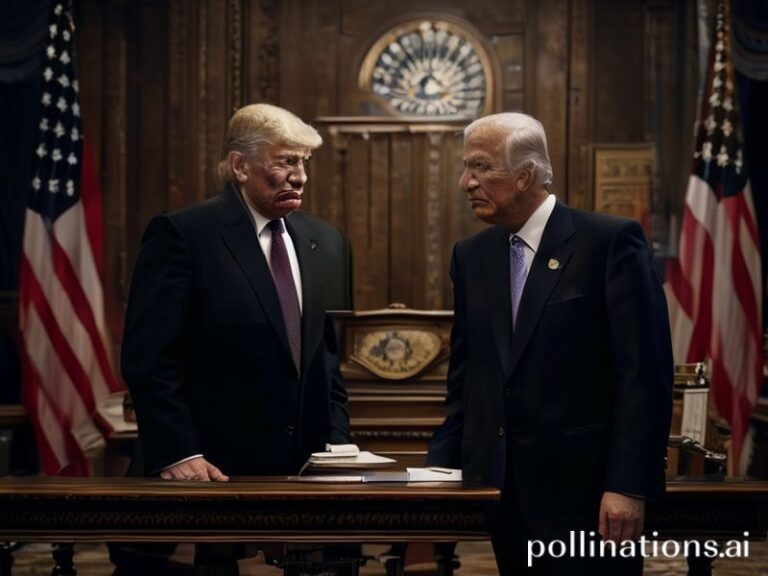How One Canadian Analyst Named Tory Horton Accidentally Became the World’s Supply-Chain Boogeyman
Tory Horton and the Global Glitch: How One Man’s Name Became the Planet’s Newest Rorschach Test
By Our Correspondent, Somewhere Between Despair and Duty
In the grand, gaudy casino of world affairs—where microchips play roulette with truth and every national leader claims to hold the winning chip—there emerged this week an unlikely ball bouncing across the green felt: “Tory Horton.” The name itself sounds like a minor British public-school prefect who decided to moonlight as a Waffle House franchisee, but appearances deceive. From Berlin think-tank Slack channels to Lagos WhatsApp groups, the phrase is being typed, tweeted, and mistranslated into seventeen languages, each dialect adding its own cultural garnish of conspiracy.
The facts, to the extent that facts still enjoy visa-free travel, are refreshingly sparse. Tory Horton appears to be a mid-level data analyst in Ottawa (the polite one, not the one where people storm parliaments with hockey sticks). Last Tuesday he published a 37-page PDF titled “Probabilistic Cascades in Global Supply-Chain Fragility,” a title so soporific it could tranquilize a charging rhino. Within 90 minutes the file had been scraped by a bored algorithm in Shenzhen, auto-translated into Korean meme-slang, and reposted with the caption “Capitalism.exe has encountered an error.” By Thursday, #ToryHorton was trending in Jakarta above both the latest K-drama finale and the regional avocado shortage.
Now, why should a spreadsheet jockey from a country best known for apologizing to snow become the Rosetta Stone for our planetary neuroses? Simple: Horton’s model predicted, with the icy detachment of a mortician’s shrug, that 11% of the world’s container traffic could seize up if three specific ports—Shanghai, Rotterdam, and Los Angeles—synchronized their inefficiencies for just eleven days. In other words, if the ports managed to trip over their own bureaucracy in perfect harmony, your next smartphone would arrive sometime after the heat death of the universe.
Cue the global interpretive dance. In Brussels, EU commissioners quoted Horton between sips of Fairtrade espresso, conveniently ignoring that their own Green Deal paperwork is already three forests deep. Over in Moscow, state television rebranded him “Comrade Horton” and claimed his numbers proved Western sanctions would backfire into an orgy of empty shelves—never mind the ruble’s ongoing limbo contest. Meanwhile, crypto bros in Dubai minted an NFT of the PDF, sold it for 42 Ethereum, and used the proceeds to charter a yacht named “Liquidity Crisis,” because nothing screams irony louder than a hedge fund on water.
The darker punchline? Horton’s model is probably right. Supply chains, those invisible capillaries feeding our Netflix-enabled lifestyles, have become the world’s most expensive Jenga tower. Remove one block—say, a pandemic, a war, or the Suez Canal having its once-a-decade temper tantrum—and the whole edifice wobbles like a drunk diplomat at last call. Horton just bothered to count the wobble in public.
International reaction followed the usual choreography: markets blinked, commodity traders updated their panic spreadsheets, and the rest of us refreshed Amazon to see if toilet paper had become a Veblen good overnight. The United Nations issued a statement urging “resilience,” which is bureaucrat-speak for “good luck finding a Plan B.” China’s Global Times reminded everyone that Belt and Road is the answer to everything, including possibly male-pattern baldness. And somewhere in the Pentagon, a general asked Siri whether “Tory Horton” was a cyber-weapon; Siri responded by crashing, thereby proving the point.
Yet beneath the frantic headlines lies a quieter, more sardonic truth: we are all now extras in Horton’s accidental horror-comedy. The next time you bite into a Peruvian blueberry in Oslo or charge a German e-scooter with Chilean lithium, remember that a mild-mannered Canadian just quantified how easily the whole circus can fold its tent. Globalization gave us same-day delivery; globalization’s hangover gives us same-day dread.
So here’s to Tory Horton, patron saint of interconnected anxiety. May his spreadsheets stay theoretical, his inbox mercifully empty, and may we never discover what happens when 12% of container traffic stalls. In the meantime, stock up on canned beans, download meditation apps, and practice that most universal of human expressions: the nervous chuckle. It travels well, requires no shipping container, and—unlike everything else these days—remains tariff-free.







